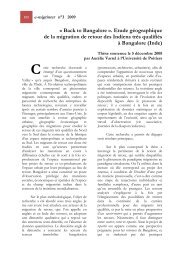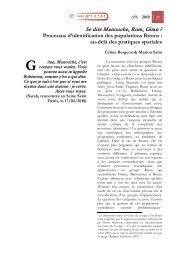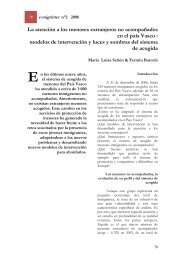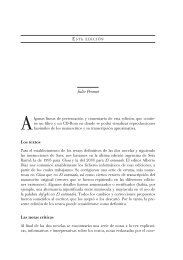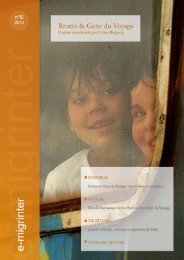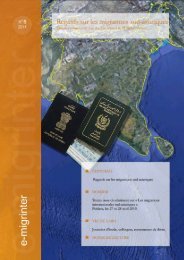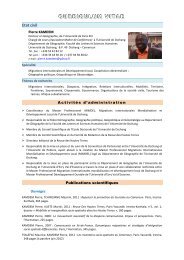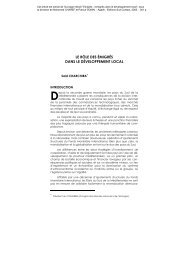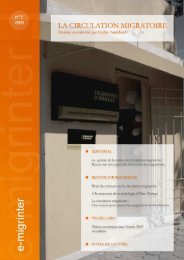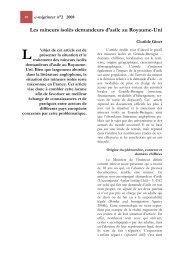e-migrinter 2010 numéro 05 - Maison des Sciences de l'Homme et ...
e-migrinter 2010 numéro 05 - Maison des Sciences de l'Homme et ...
e-migrinter 2010 numéro 05 - Maison des Sciences de l'Homme et ...
Create successful ePaper yourself
Turn your PDF publications into a flip-book with our unique Google optimized e-Paper software.
64 n°5 <strong>2010</strong><br />
skilled migrants are poorly integrated into<br />
the Finnish soci<strong>et</strong>y.<br />
Towards social integration: the role of<br />
the third sector<br />
A recent report (Carroll <strong>et</strong> al, 2009)<br />
commissioned by the City of Helsinki Urban<br />
Facts centre recognises three stages in<br />
successfully attracting and committing<br />
skilled migrants to Finland. First stage is to<br />
find and recruit the right type of migrants.<br />
Secondly, the company must educate and<br />
integrate the skills of these migrants in or<strong>de</strong>r<br />
to g<strong>et</strong> the best benefits from their<br />
‘investment’. The third stage should be to<br />
integrate the migrant as an individual, as this is<br />
the only way to gain long term benefit by<br />
committing the person to stay. This last<br />
point is often ignored or poorly executed.<br />
Therefore integration stops within the work<br />
place, leaving the migrant disconnected from<br />
Finland and its soci<strong>et</strong>y.<br />
Having a life outsi<strong>de</strong> the workplace is<br />
naturally important for quality of life. The<br />
studies previewed show that various levels of<br />
social integration, finding meaningful<br />
activities and having friends are recognised<br />
as important factors for skilled migrants who<br />
consi<strong>de</strong>r remaining in the country. At the<br />
very least, unhappiness in one’s social life<br />
can bring ad<strong>de</strong>d pressure to leave. These<br />
issues are not, however, part of the official<br />
integration programme <strong><strong>de</strong>s</strong>igned by the<br />
state, or even part of the private relocation<br />
services often provi<strong>de</strong>d by employers 14 .<br />
Issues with social life are therefore left<br />
for the individuals themselves to figure out.<br />
Help in this matter could be provi<strong>de</strong>d by the<br />
third sector. The Advisory Board for Ethnic<br />
Relations (ETNO), a working group<br />
appointed by the Ministry of the Interior,<br />
has recommen<strong>de</strong>d that the role of the third<br />
sector should be clarified and emphasised in<br />
14 These relocation services concentrate only on the<br />
practicalities after arriving in Finland, such as finding<br />
an apartment, g<strong>et</strong>ting permits, schooling and<br />
healthcare, and finding employment for spouses.<br />
the integration of immigrants, and ma<strong>de</strong> into<br />
an official part of the integration<br />
programme. So far the role of third sector<br />
organisations has been to work against<br />
racism and to maintain cultural contact<br />
within any one <strong>et</strong>hnic/cultural group. Third<br />
sector organisations and projects could,<br />
however, be very helpful in working as<br />
avenues of cross-cultural un<strong>de</strong>rstanding, as<br />
well as integrating and committing also<br />
skilled immigrants (ETNO, 2008).<br />
Carroll <strong>et</strong> al’s report agrees. They<br />
conclu<strong>de</strong> that the involvement of third<br />
sector services geared at establishing social<br />
contacts and activities is nee<strong>de</strong>d for<br />
successful social integration of skilled<br />
migrants (2009) 15 . These services can<br />
improve knowledge of cultural and<br />
communicational differences on both si<strong><strong>de</strong>s</strong><br />
and are therefore ultimately what may<br />
change the unflattering views of the Finnish<br />
culture, people and styles of communication<br />
from the negative column to the positive.<br />
Third sector is also where important peer<br />
support could be organised. Trux (2002) has<br />
remarked that as well as wanting to make<br />
contacts with Finnish people, many skilled<br />
migrants feel the need to me<strong>et</strong> their<br />
compatriots and partake in activities in their<br />
own language. As one informant puts it: The<br />
coldness of Finnish people is starting to g<strong>et</strong> to me. If<br />
I had not been able to talk about my impressions<br />
with other foreigners at our company, I would have<br />
probably gone crazy (ibid:2<strong>05</strong>).<br />
Paying more attention to social<br />
integration outsi<strong>de</strong> the workplace would<br />
compl<strong>et</strong>e the continuum of successful skilled<br />
migration policies from recruitment to<br />
arrival, and to integration that aims at<br />
committing the migrants to stay. In this<br />
aspect research into the social sphere of the<br />
lives of skilled migrants in Finland can be<br />
15 There are already such services, but the field<br />
functions mainly on voluntary and hobby basis and<br />
attracts hardly any public funding. For an example,<br />
see Jolly Dragon, a Helsinki based activities<br />
organisation bringing tog<strong>et</strong>her Finns and foreigners in<br />
a social s<strong>et</strong>ting (www.jollydragon.n<strong>et</strong>).



